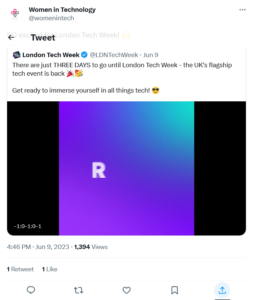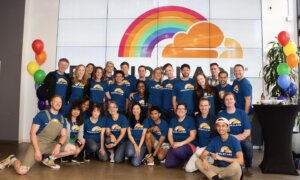Women in Tech: the importance of allyship

• Allies are crucial to speeding up inclusivity for women in tech.
• Community can be a multifaceted web of connections.
• The evolution of the workplace and society is a never-ending process.
In Part 1 of this article, we spoke to Jen Taylor, Chief Product Officer at Cloudflare (and formerly of Salesforce, Facebook, and Adobe) about the barriers she still sees to women’s entry into – and progress through – careers in the tech industry.
In Part 2, she walked us through the process of finding community in the workplace – and how people will find that community, irrespective of whether there are many people exactly like them or not.
As we were ending Part 2, Jen mentioned the importance of finding not just a community of the same type of people, whether that be women in tech, the queer community, people of color, or any of the other communities with which people identify, but also building community with allies from other groups, upto and including the dominant group.
We wanted to explore the idea of community with allies a little further with her.
The multifaceted community.
THQ:
We wondered about the levels of intersectional support and community within the tech industry. Does it exist? Is it growing?
JT:
I think there are two parts to it, and one goes back to something I touched on in Part 2, which is the idea that we’re all really multifaceted. Women of color, men of color, queer men, trans people, we’re all these multifaceted people. We all find these communities.
And I think the more that we can do to bring inclusivity to the surface and use those intersections as ways of bringing community together, the better we’ll be.
The other really important thing is inviting allies into your community, and spending the time to develop relationships with them, to help allies feel welcome, to invite allies in to help, to educate them on other perspectives than their own, and then really pull them into the conversation, so that they can become mentors and advocates.

READ NEXT

Women in Tech: barriers to inclusion
It’s interesting – the Women in Engineering organization asked our SVP of engineering – who’s a man – to be their executive sponsor. And he came to me and said “Do you think I should do it?” Like, I get it, you’re not a woman, but that’s huge. It’s important – they’re inviting you in as a leader, but they’re also really doing it as a way to invite allyship in, and make the notion of furthering the community of women in engineering not just something that is about women, but something that’s about the broader community of engineering.
THQ:
Don’t overthink it, take the honor, and use whatever platform you have to help, right?
The gas pedal.
JT:
Yeah, because I do think it goes back to the conversation we were having in Part 2 – what would help this process of evolving the workplace go faster?
Allies. You know, that’s how the cultural change really comes in, when you build those relationships with allies.
THQ:
So it’s stops being “burn it to the ground” and starts being “Educate it from the ground up”?
JT:
Yeah. And the education works both ways.

Proudflare, an LGBTQIA+ community within Cloudflare.
THQ:
That leads us to a logical question. From where we started out, where tech, where engineering, where even professional education and work was unheard of for women, there’s been progress – no doubt.
What needs to happen to the industry, and to the world in general, in terms of its social conditioning factors, to achieve equity of opportunity, to achieve inclusiveness, to achieve the world that we want to live in?
What sort of things do we need to do that can be done without taking forever?
JT:
Again, I think there are two pieces to this.
One, it builds on what we’ve talked about already. Progress moves the bar, so the next progress is further – and if you can find community, and include allies, the bar moves further, faster.
And the second thing is that cultural change accelerates over time. Things that were obscure or unusual when my mother was my age to my age are different. If I look at my grandmother, if I go back into the generations, you know, my grandmother was born before women could vote. And now we have a woman as Vice President.
Cultural change takes time, and it will build upon itself. We need to kind at once both patient and deliberate and continuing to further the work that we’re doing.
READ NEXT

Women in Tech: building community
We need to continue to make it the work that we all do, to build more diverse and more inclusive environments, not just the roles and responsibilities of people who come from those communities.
No shining city on the hill?
The other thing is, I think we all dream of a day on which this will be done. I fundamentally believe that this is a journey that will never be done. I think the notion of creating change, and most of all, creating equity and equality for people of all sorts of different backgrounds is something we’re always going to be wrestling with.
I think that we are as humans programmed to at once embrace community and also take a little while to wrap our heads around the differences between us. This is deliberate work that we all have to keep doing and doing together.
THQ:
That’s happening in the wider world, too. There were trans people back at Stonewall. But it’s almost like now we have equality of marriage, and legal rights, for a lot of the broader society in the world, it’s like trans people have just popped into existence. And now theirs is the next battle that has to be won. They’ve been with us all this time, but now mainstream heteronormative society is looking at them, because they dare to say they deserve to be taken seriously.
As you say, these things are never done. But progress is made by community, by bringing in allies, and by re-defining the boundaries of “normality.”
JT:
Exactly. But whether it’s women, or people of color, or queer people of any and every kind, the key to diversifying the tech industry, and industry in general, and making it genuinely inclusive, comes down to those three things.
Mentors – who can help lift us up and help us to grow.
Advocates – who can bring weight to our fight when we need it.
And allies – so our fight isn’t as hard perhaps as it has been in the past.
That’s how I think we change the world.

Jen Taylor, of Cloudflare.








